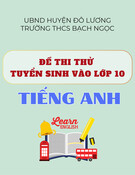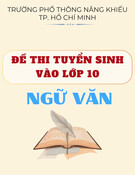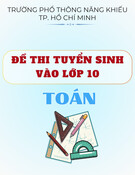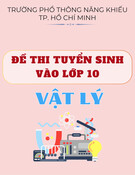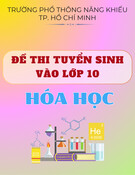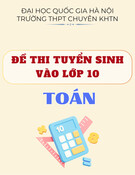
Tr ng THCS Khai Quangườ Năm h c 2020-2021ọ
Đ C NG ÔN T P VÀO L P 10 – TI NG ANHỀ ƯƠ Ậ Ớ Ế
TENSES (Thì)
TENSES
USE SIGNAL WORDS EXAMPLES
SIMPLE PRESENT - thói quen hi n t iở ệ ạ - always, usually, often, - She often goes to
(HI N T I ĐN)Ệ Ạ Ơ - s th t, chân lí.ự ậ sometimes, seldom, rarely, school late.
+: S + V1 / V(s/es) never, every, normally, - The sun rises in the
regularly, occasionally, as a east.
-: S + don’t/ doesn’t + V1 rule …
?: Do / Does + S + V1 …?
- hành đng đang di n raộ ễ - at the moment, now, right - I can t answer the‟
PRESENT PROGRESSIVE
vào lúc nói. now, at present phone. I’m having a
(HI N T I TI P DI N)Ệ Ạ Ế Ễ - d đnh s th c hi nự ị ẽ ự ệ - Look! bath.
trong t ng lai g n.ươ ầ - Listen! - She is going to the
+: S + am/is/are + V-ing - hành đng có tính ch tộ ấ - Be quiet!
cinema tonight.
t m th i.ạ ờ - Keep silence! - He often goes to work
-: S + am/ is/ are + not + V-ing Note: m t s đng tộ ố ộ ừ by car, but today he is
th ng không dùng v i thìườ ớ taking a bus.
?: Am / Is /Are + S + V-ing? ti p di n: ế ễ like, dislike, hate,
love, want, prefer, admire,
believe, understand,
remember, forget, know,
belong, have, taste, smell,
….
PRESENT PERFECT
- hành đng b t đu trongộ ắ ầ - lately, recently (g n đây)ầ- I have learnt English
(HI N T I HOÀN THÀNH)Ệ Ạ quá kh , kéo dài đn hi nứ ế ệ - so far, up to now, up to for five years.
t i và có th ti p t c trongạ ể ế ụ the present (cho t i bâyớ
+: S + has / have + P.P t ng lai.ươ gi )ờ
- hành đng v a m i x yộ ừ ớ ả - already, ever, never, just, - She has just received
-: S + has / have + not + P.P ra. yet, for, since. a letter from her father.
- how long …
?: Has / Have + S + P.P? - this is the first
time/second time…
- many times / several times
SIMPLE PAST
- hành đng x y ra vàộ ả - yesterday, last week, last - She went to London
(QUÁ KH ĐN)Ứ Ơ ch m d t m t th i ấ ứ ở ộ ờ
đi mểmonth, …ago, in 1990, in last year.
xác đnh trong quá kh .ị ứ the past, …
+: S + V2 / V-ed - m t chu i hành đngộ ỗ ộ - The man came to the
x y ra liên t c trong quáả ụ door, unlocked it,
-: S + didn’t + V1 kh .ứentered the room, went
- m t thói quen trong quáộto the bed and lay down
?: Did + S + V1 ….? khứon it.
- When we were
students, we often went
on a picnic every
weekend.

Tr ng THCS Khai Quangườ Năm h c 2020-2021ọ
PAST PROGRESSIVE - hành đng đang x y raộ ả - at that time, at (9 o clock)‟- He was doing his
(QUÁ KH TI P DI N)Ứ Ế Ễ
t i m t th i đi m xácạ ộ ờ ể last night, at this time (last homework at 8 o clock‟
đnh trong quá khị ứ week), last night.
+: S + was / were + V-ing - hai hành đng cùng x yộ ả - The children were
ra đng th i trong quáồ ờ playing football while
-: S + was / were + not + V-ing khứtheir mother was
cooking the meal.
?: Was / Were + S + V-ing…?
PAST PERFECT
- hành đng x y ra tr cộ ả ướ - already, ever, never, - When I arrived at the
(QUÁ KH HOÀN THÀNHỨhành đng khác ho cộ ặ before, by, by the time, party, they had already
tr c m t th i đi m trongướ ộ ờ ể after, until, when, …. left.
+: S + had + P.P quá khứ- I had completed the
English course by
-: S + hadn’t + P.P 1998.
?: Had + S + P.P …?
SIMPLE FUTURE
- hành đng s x y raộ ẽ ả - tomorrow, next, in 2012, - He will come back
(T NG LAI ĐN)ƯƠ Ơ
trong t ng laiươ …. tomorrow.
- m t quy t đnh đcộ ế ị ượ - I think / guess - The phone is ringing.
+: S + will / shall + V1 đa ra vào lúc nóiư- I am sure / I am not sure I will answer it.
-: S + will / shall + not + V1
(won’t / shan’t + V1)
?: Will / Shall + S + V1 …?
L u ý cách dùng c a ư ủ Be going to + V1
-di n t m t d đnh đã đc s p đt tr cễ ả ộ ự ị ượ ắ ặ ướ
-di n t m t d đoán có căn cễ ả ộ ự ứ
Ex: The sky is absolutely dark. It is going to rain.
Note:
-hai hành đng x y ra trong quá kh :ộ ả ứ
. hành đng ng n dùng thì quá kh đn, hành đng dài dùng thì quá kh ti p ộ ắ ứ ơ ộ ứ ế
di n Ex: Yesterday morning, I ễmet my friend while I was going to school.
. hành đng x y ra tr c dùng thì quá kh hoàn thành, hành đng x y ra sau dùng thì ộ ả ướ ứ ộ ả
quá kh đn Ex: She ứ ơ went out with her friends after she had finished her homework.
She had finished her homework before she went out with her friends.
M t s cách hòa h p thì gi a m nh đ chính và m nh đ th i gian:ộ ố ợ ữ ệ ề ệ ề ờ
Main clause Adverbial clause of time
(M nh đ chính)ệ ề
(M nh đ tr ng ng ch th i gian)ệ ề ạ ữ ỉ ờ
Present tenses
Present tenses
Past tenses
Past tenses
Future tenses
Present tenses
1.TLĐ + until / when / as soon as + HTĐ
I will wait here until she comes back.
2. TLĐ + after + HTHT He will go home after he has finished his work.

Tr ng THCS Khai Quangườ Năm h c 2020-2021ọ

Tr ng THCS Khai Quangườ Năm h c 2020-2021ọ
3. while / when / as + QKTD, QKĐWhile I was going to school, I met my friend.
4. QKĐ + while / when / as + QKTD
It (start) ---------------
to rain while the boys (play)--------------
football.
5. QKTD + while + QKTD
Last night, I was doing my homework while my sister was playing games.
6.
HTHT + since + QKĐI (work) --------------------
here since I (graduate)---------------------
.
7.
After + QKHT, QKĐAfter I had finished my homework, I (go) --------------- to bed.
8.Before / By the time + QKĐ + QKHT
Before she (have) ----------------
dinner, she (write)------------- letter.
PASSIVE VOICE (Câu b đng)ị ộ
I. CÁCH CHUY N ĐI T CÂU CH ĐNG SANG CÂU B ĐNGỂ Ổ Ừ Ủ Ộ Ị Ộ
Active: SUBJECT + VERB + OBJECT
Passive: SUBJECT + BE + P.P + BY + OBJECT
II. CÁCH CHUY N ĐI HÌNH TH C ĐNG T C A M T S THÌỂ Ổ Ứ Ộ Ừ Ủ Ộ Ố
TENSES ACTIVE FORM PASSIVE FORM
Simple present V1 / Vs(es) Am / is / are + P.P
Present continuous Am / is / are + V-ing Am / is / are + being + P.P
Present perfect Has / have + P.P Has / have + been + P.P
Simple past V2 / V-ed Was / were + P.P
Past continuous Was / were + V-ing Was / were + being + P.P
Past perfect Had + P.P Had + been + P.P
Simple future Will / shall + V1 Will / shall + be + P.P
Future perfect Will/ shall + have + P.P Will / shall + have + been + P.P
Note:
-Tr ng t ch n i ch n đng tr c by + O; tr ng t ch th i gian đng sau by + Oạ ừ ỉ ơ ố ứ ướ ạ ừ ỉ ờ ứ
-N u ch t trong câu ch đng là t ph đnh thì đi sang câu b đng ph đnh.ế ủ ừ ủ ộ ừ ủ ị ổ ị ộ ủ ị
-Các ch t someone, anyone, people, he, she, they … trong câu ch đng thì có th b “by + O” trong câu b ủ ừ ủ ộ ể ỏ ị
đngộ
WISH CLAUSES (M nh đ mong c)ệ ề ướ
Có 3 d ng câu mong c:ạ ướ
-Mong c không th t hi n t i:ướ ậ ở ệ ạ
KĐ: S + wish(es) + S + V2/-ed + O
PĐ: S + wish(es) + S + didn t + V1‟
Ex: Ben isn t here.‟I wish Ben were here.
I wish I could swim.
(to be: were / weren t)‟
-Mong c không th t quá kh :ướ ậ ở ứ
KĐ: S + wish(es) + S + had + V3/-ed

Tr ng THCS Khai Quangườ Năm h c 2020-2021ọ
PĐ: S + wish(es) + S + hadn t + V3/-ed‟
-Mong c không th t trong t ng laiƯớ ậ ươ

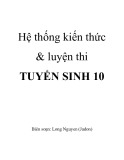
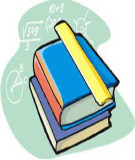

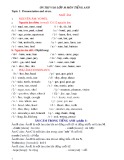
![Tài liệu ôn luyện Tiếng Anh vào lớp 10 [năm học]: Tuyển tập mới nhất, chuẩn nhất](https://cdn.tailieu.vn/images/document/thumbnail/2020/20200706/huywong98/135x160/9391594049485.jpg)

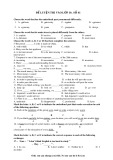
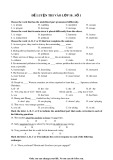



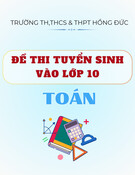
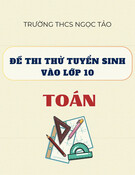
![Dàn ý và bài văn mẫu nghị luận xã hội ôn thi vào lớp 10: Tài liệu [mô tả/định tính]](https://cdn.tailieu.vn/images/document/thumbnail/2025/20250824/levanphuong15081979@gmail.com/135x160/23851756089220.jpg)
